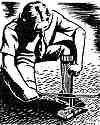|
This
philosophy is certainly at odds with the creed of
dictatorship and no doubt is one of the reasons why neither Hitler nor
Mussolini would tolerate scouting in place of their own youth movements.
 Second in the list of scout objectives is the development of
individual skill and handicraft. When we stop to analyze education, I
believe we all recognize the existence of two schools: the formal
school set up by the competent educators, the classroom in which our
young people learn, in addition to the classic three R's, many other
facts that are useful to them in later life. The other school in which
the scout is interested is the limitless field of nature. Among the
special studies are wood lore and the practice of living outdoors. In
both of these schools, handicraft - that is the making of things - is
encouraged. Americans have always been noted for their ability and
resourcefulness under all conditions. We know how to improvise and to
make the best of any situation. Nothing has emphasized the importance
of this training more than the present war where steaming jungles,
sandy desert and stormy seas have taxed man's ingenuity to the limit.
Second in the list of scout objectives is the development of
individual skill and handicraft. When we stop to analyze education, I
believe we all recognize the existence of two schools: the formal
school set up by the competent educators, the classroom in which our
young people learn, in addition to the classic three R's, many other
facts that are useful to them in later life. The other school in which
the scout is interested is the limitless field of nature. Among the
special studies are wood lore and the practice of living outdoors. In
both of these schools, handicraft - that is the making of things - is
encouraged. Americans have always been noted for their ability and
resourcefulness under all conditions. We know how to improvise and to
make the best of any situation. Nothing has emphasized the importance
of this training more than the present war where steaming jungles,
sandy desert and stormy seas have taxed man's ingenuity to the limit.The third objective is health and sports. We in this country have always made much of sports and physical training. There is an old saying that a healthy mind resides in a healthy body, and it is part of the creed of the Boy Scout to keep them this way through proper exercise and self-care. |








